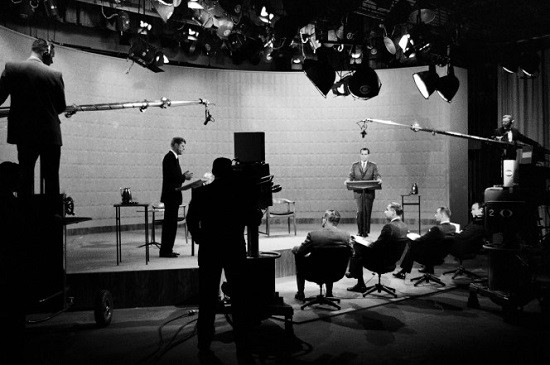The five worst mistakes in the history of the US presidential election
The live debates not only show the power of television in the race between US presidential candidates, but also reveal the possibility of a candidate failing even if he makes a small mistake such as not applying makeup properly or accidentally looking at his watch...
A televised debate between US Vice President Richard Nixon and Massachusetts Senator John F. Kennedy in New York in 1960. Photo: AP. |
In 1960, US Vice President Richard Nixon made a fateful mistake when he decided to forgo makeup for his historic televised debate with Massachusetts Senator John F. Kennedy on September 26. Nixon applied only a little Lazy Shave powder to hide his dark circles, looking sickly and outshone by his tanned, healthy-looking opponent. The indelible images led many television viewers to vote for Kennedy, even as radio listeners voted for Nixon.
Nixon's defeat led to a general avoidance of televised debates until 1976, when President Gerald Ford accepted a challenge from former Georgia Governor Jimmy Carter. Ford, mocked for his lack of intelligence, made a major blunder in the October 6 debate in San Francisco, saying he was confused when answering a question about the Cold War. Ford lost and Carter won, arguing that "America and the world need a leader who understands the world better."
But then Mr. Carter sabotaged himself in a debate with Ronald Reagan on October 28, 1980, in Cleveland. During a discussion about the nuclear arms race, Carter said he wanted to “put what we’re talking about in context”—citing a conversation with his then-13-year-old daughter, Amy. Meanwhile, California Governor Reagan used a question to captivate a record 80.6 million television viewers: “Is your life better than it was four years ago?” That question helped Mr. Reagan win and become the 40th president of the United States.
Eight years later, on October 13, 1988, in Los Angeles, Vice President George Bush and Massachusetts Governor Michael Dukakis met for the second debate. Dukakis was asked if his position would change if his wife had been raped and murdered. Democratic candidate Dukakis responded unemotionally, questioning the deterrent value of the death penalty and allowing Bush to attack him on the “values question.” Bush benefited from CNN journalist Bernard Shaw’s question because Dukakis’s answer showed that he was unsentimental and ignorant of domestic policy.
Bush defeated Dukakis in November, but lost the 1992 Town Hall to Bill Clinton. Bush was caught looking at his watch when a female audience member asked about the impact of the national debt on the candidates’ “personal lives.” Bush repeatedly dodged the question, and “buried himself” by saying, “I don’t understand the question… I’ll try to answer it.” Meanwhile, Democratic candidate Bill Clinton said he “understands the pain of the people.” As a result, Clinton was supported because he shared with the people.
According to Baotintuc




.jpg)
.jpg)



